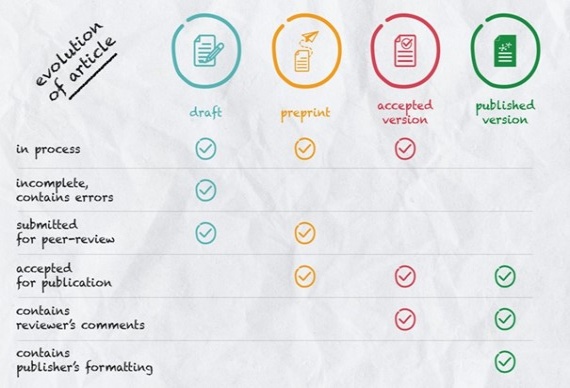Green open access combines publishing in scientific journals (subscription-based and open) and self-archiving an article in an open repository. Possibilities of self-archiving are given by the self-archiving policies of the publishers. However, if a licensing agreement has been concluded, self-archiving is governed by its terms and coditions.
To publish via green open access, following steps need to be taken.
Preferably before publishing the article, find out if it can be archived and published in an open repository (self-archiving) and under what conditions. Terms and conditions are usually set down in the licensing agreement concluded with the publisher (often referred to as a Licensing Agreement or Copyright Transfer Agreement).
If a licensing agreement has not been concluded, look for self-archiving policy:
on the journal/publisher’s website
in the SHERPA/RoMEO service
What to do when a publisher does not allow self-archiving? You can ask the publisher to conclude an addendum to the licensing agreement. A sample form can be found on the European Commission website, SPARC, Scholar’s Copyright Addendum Engine, or the OpenAIRE website.
You can publish an article in the traditional way in a subscription-based journal (available via subscription) or in an open access journal.
When submitting an article to a repository and making it openly available, it is necessary to follow terms set by the publisher (see concluded contract or self-archiving policy of the journal/publisher).
Above all, the self-archiving policy states:
In the contract, the publisher can determine what version of the article is the author entitled to make available via open access. For scientific articles, we distinguish three versions as follows:
Preprint – The version sent by the author to the editor, i.e. before the peer review.
Postprint – The version incorporating comments and adjustments from the peer review.
Publisher version – The version as published in a journal (with pagination, assigned DOI, using journal design)

Due to exclusivity of content distribution, the publisher may impose a time embargo on open access. In this case, it is possible to save the article in a repository, but it may not be made openly available until after a specified period.
The publisher may specify in which repository type the article can be archived:
Institutional – A repository of an organization that typically allows only members of that organization to store and access the results. Example: CU Research Publications Repository (more information can be found in separate section)
Disciplinary (subject) – A field or subject-specific repository that typically allows members of either the field‘s research community or the relevant overarching organization to submit results either members of that field community or relevant associating organizations. Example: arXiv.org or Pubmed Central
Multidisciplinary – A repository that is unrestricted by organization membership or field specialization. Example: Zenodo
In extreme cases, the publisher allows the article to be published only on author’s personal pages – but this is not the preferred method, as long-term archivation and availability is not ensured on standard websites.
You can use the Directory of Open Access Repositories (OpenDOAR) or the European OpenAIRE platform to find a suitable repository to publish your article or to search for relevant literature.
Residency, Invoicing and Correspondence Address
Charles University
Central Library
Ovocný trh 560/5
116 36 Prague 1
Czech Republic
Office Address
José Martího 2 (2nd floor)
160 00 Prague 6
Phone: +420 224 491 839, 172
E-mail: openscience@cuni.cz
Www: openscience.cuni.cz